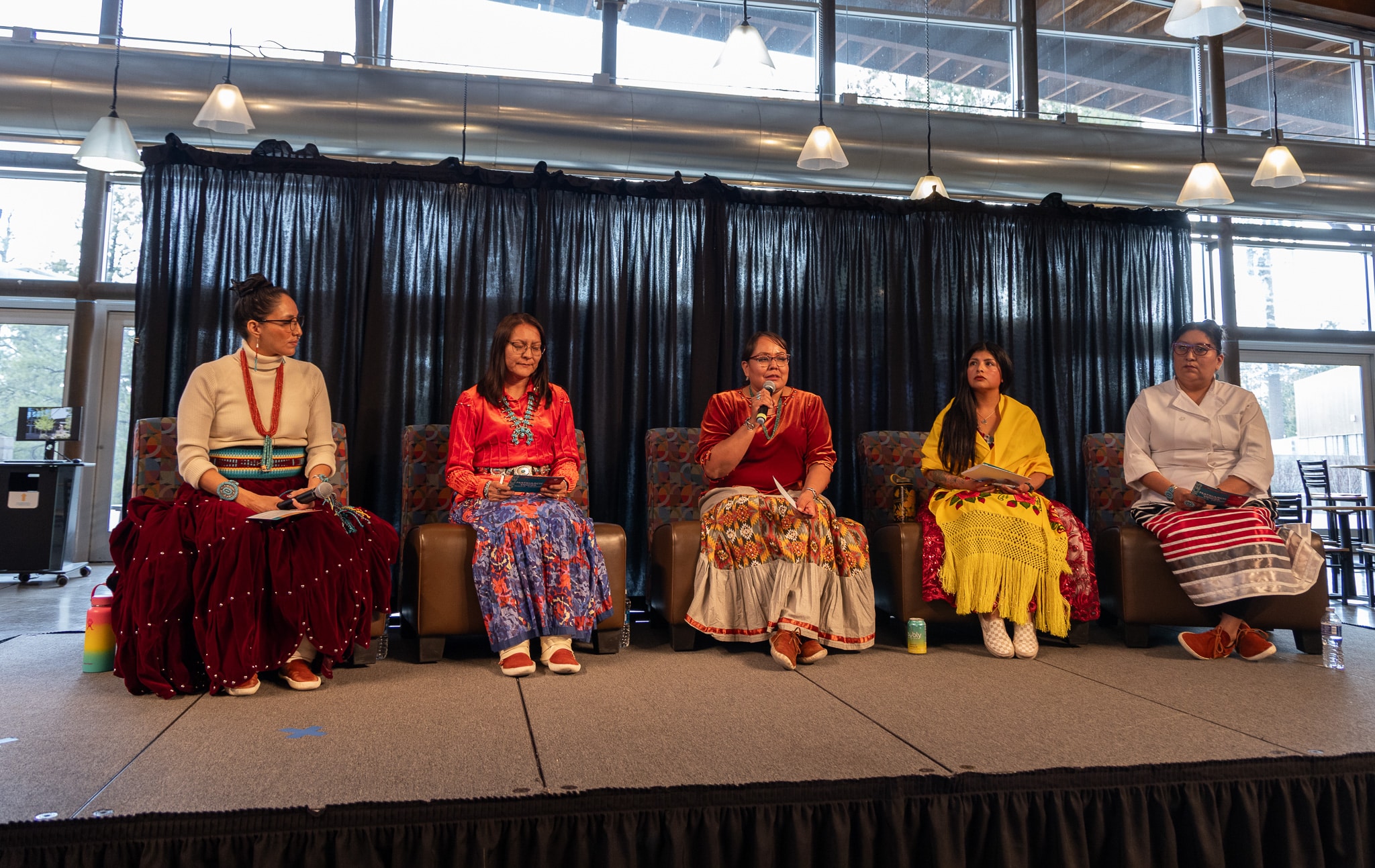At Coconino Community College (CCC), a Native American-Serving Nontribal Institution in Northern Arizona, a powerful shift began six years ago. When a 2019 retention analysis revealed opportunities to better support Native American students — a spark was lit in the heart and mind of Brian Francis, who, at the time, served as the college’s director of academic advising.
Confident that CCC, a Native American-Serving Nontribal Institution located in Northern Arizona, could do more to improve completion, transfer, and course success rates for its Native students, Francis and his colleagues collaborated on writing a grant proposal to accomplish this goal.
As a result of their dedication and vision, the college received a $1.2 million Native American-Serving Nontribal Institution Grant in 2021 from the U.S. Department of Education. The funds kindled the flame and ignited a new program at CCC: the Strengthening Indigenous Student Success Project. Launched in 2022, with Francis taking on a new position as the program’s coordinator, the project laid the foundation — like stones around a hearth — for new spaces, programs, and relationships that are helping Native students feel seen, supported, and rooted in community.
When asked to describe the project’s focus, Francis doesn’t reach for institutional jargon. Rather, he likens the major aspects of the project — Native American student success centers, a Summer Bridge program for Native students, and culturally responsive pedagogical training and curricular design — to the components of a traditional Native upbringing.
Native American success centers: The hogan, the fireplace, and the extended family
The grant enabled CCC to establish two Native American success centers — one on its Lone Tree campus in West Flagstaff and one on its Page campus. The centers provide a space for students to access advising, tutoring, and peer mentoring as well as loaner laptops, books, and other materials. A retention advisor serves students at the Page campus success center while a career advisor supports students at the Lone Tree location.
For CCC’s Native students, the centers metaphorically serve as hogans, the traditional Indigenous homes of peoples native to the Arizona/New Mexico region.
“The Native American success centers represent that sense of place, that sense of belonging for a student to come here and say, ‘Hey, this is my home,’” says Francis. “A place they can come to where they feel a sense of welcoming.”
According to Francis, just as every hogan is constructed around a central fireplace, which represents a people’s connection to their culture, the Native American success centers also have metaphorical fireplaces, providing a space for Native identities to be expressed and for learning to occur in a culturally responsive manner.
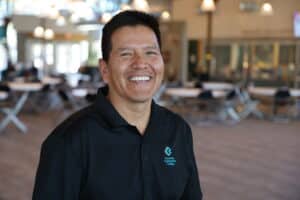
Brian Francis
And just as one living in a traditional hogan benefits from the support of their co-habiting extended family, students visiting the center benefit from an extended family support model, learning not just from advisors but from peer mentors as well. Francis compares the dynamic to acquiring knowledge not just from members of an older generation — parents, aunts, uncles, grandparents, etc. — but also from cousins. “Our peer mentors have been in college, and they’re part of the college system here and understand the challenges and struggles. So, they’re sharing that information with [newer students],” he says.
Peer mentors provide support and guidance to fellow students in a variety of ways, offering academic assistance as well as pointing the way to key resources — on or off campus — to help tackle common difficulties. Such difficulties include mental health concerns and, as peer mentor Niki McCabe points out, housing and commuting challenges. As a student who travels an hour and a half each way to and from the Navajo reservation to attend CCC, she is well acquainted with the struggles. “A lot of [our peer support is around] transportation or housing,” she shares. “We don’t have housing here, so it’s kind of difficult because housing in Flagstaff is really expensive.”
Often, peer mentors simply provide an additional encouraging voice and act as a sounding board. “Sometimes, it’s just a matter of guiding them and allowing them to discover what they can do themselves,” says peer mentor Mckayla Gilbert. “We understand what every student goes through to some extent. And I think it’s just nice to be able to talk to someone who’s on the same level as you — but also who has maybe a little more experience.”
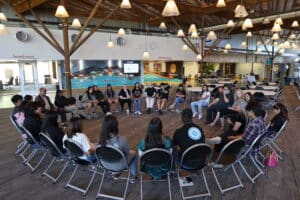
Students participate in the Summer Bridge program orientation on the CCC Lone Tree Campus. (Courtesy of Coconino Community College).

A panel of Indigenous women share powerful stories of leadership, resilience, and community as part of “Matriarch Voices: Indigenous Women Leading,” an event spearheaded by peer mentor Niki McCabe for Women’s History Month. (Courtesy of Coconino Community College)
Summer Bridge program: The rite of passage and generational continuity
Peer mentors like McCabe and Gilbert play an instrumental role in another key aspect of the Strengthening Indigenous Student Success Project: the Summer Bridge program, which provides Native and economically marginalized high school graduates the opportunity to take an English composition class as well as a one-credit college success course at CCC.
According to Francis, the Summer Bridge program is the answer to the question: “How can we get these brand new students, who may have an idea of college but may not have all the understandings of it, to the college to give them a sense of purpose but also give them the tools to succeed?”
The program is offered free of charge, and all necessary books are provided at no cost to students.
Francis looks to the peer mentors and their contribution to the Summer Bridge program’s success as a key contributor to bringing CCC’s efforts to support Native students full circle. Many students who participated in the first Summer Bridge program have graduated or transferred, and some have become peer mentors themselves in order to support the next cohort of program participants. One former peer mentor is now employed by CCC as a full-time academic advisor. “It’s really kind of like the students are starting to run the program,” Francis marvels.
Culturally responsive curricula and teaching; Sharing knowledge from the fireplace
The Summer Bridge program is one place where the Strengthening Indigenous Student Success Project’s focus on culturally responsive teaching and learning is evident. But the effort is widespread to infuse the entire college’s curriculum with cultural elements as well as introduce the largely non-Native faculty to an Indigenous model of learning and relating.
Francis says the college has provided trainings to “help the faculty … relate to the students as a first-generation college student or a low-income student, or a Pell-eligible student and make that relationship with them — and also have some cultural components [in the curriculum] that represent our students here.”
“It’s a sharing of that knowledge from the fireplace within our curriculum for culturally responsive teaching strategies,” he states. “That’s the best way I can explain it.”
Indicators of success
Now in the fourth year of the five-year grant, CCC has seen promising results from the Strengthening Indigenous Student Success Project. Success rates among Native students at the college have increased for both college math and precalculus. There has also been an increase in successful completion of English composition, particularly among Summer Bridge participants, who have seen their success rate for the course jump from 50% in the 2021–2022 academic year to its current rate of 82%. In addition to increasing its Native American enrollment since the project’s inception, CCC has doubled its completion and transfer rate from 25% to 50%.
Not all the advances can be communicated by facts and figures, however. A growing number of Indigenous students are stepping into leadership roles within the college, Francis reports, and, in the past two years, two Summer Bridge participants have served as Commencement speakers.
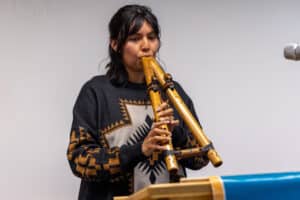
Student Kelly Yessilth plays traditional Navajo music on the flute during the Page campus end-of-year student award ceremony. (Courtesy of Coconino Community College)
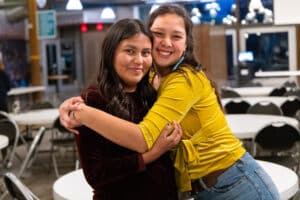
Peer mentors Niki McCabe and Mckayla Gilbert (Courtesy of Coconino Community College)
Keeping the fire burning
In addition to the efforts the college has carried out as part of its grant work, it has taken other notable steps toward supporting its Native student population that have stemmed indirectly from the work supported by the grant. Conversations around culturally responsive teaching, for example, led to the creation of an Applied Indigenous Studies program, and a connection made with the Navajo Nation will bring former Tribal President Jonathan Nez to campus to teach it this fall.
In addition, a new Presidential Advisory Council of Native Voices was created to represent the interests of Native students and advise CCC’s president, Dr. Eric Heiser. The council is composed of professionals outside of CCC, working in the wider community, who are in a position to share valuable information and insight about matters relating to the area’s Indigenous population, including issues concerning K–12 education and housing.
“We’ve seen some really good things happen because of [the grant], and it’s brought a lot of attention to the Indigenous communities, so it’s really cool to see all these things,” Francis notes.
A major focus for Francis is ensuring that the supports made possible by the grant will continue even after the grant period ends. He feels optimistic about the prospect. “What I like about this grant is that we have an institutionalization process in our annual performance report,” he shares. “And so, the college is working on how we institutionalize this program. And we’ve already been in discussions about what the Native success center would look like here [at Lone Tree] and at Page and also the Summer Bridge program. And the college is committed to doing that.”
But Francis isn’t content with just maintaining the status quo. He is actively looking for additional opportunities to keep the momentum going. For example, he would like to expand health education programs, particularly on the Page campus, which is closer to the Navajo reservation, and collaborate with Indian Health Services to provide experiential learning opportunities for students; build on the Applied Indigenous Studies program to make it more robust; and better align programming with labor market needs in Native communities.
There is little doubt that Coconino Community College, has lit the fireplace — a symbol of cultural grounding that represents both the warmth of belonging and the light that serves as a beacon for clarity, direction, and growth. Through the Strengthening Indigenous Student Success Project, CCC has created a space where tradition and transformation burn side by side, where students connect, learn from, and encourage one another as they work to shape their futures — all while being supported by faculty and staff who are committed to fostering a learning environment rooted in respect, cultural understanding, and shared purpose. Thanks to the efforts of Brian Francis, his colleagues, CCC’s administration, and student mentors, the fire is no longer just a spark — it’s a sustained flame, tended by a growing circle of learners, supporters, and leaders. And as more students step forward to add their own kindling, the glow of Indigenous student success promises to illuminate the path for years to come.
